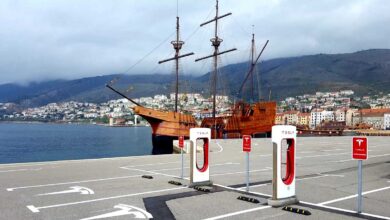New EV owners left fuming over unexpected motion sickness while driving as doctor confirms ‘it’s a real thing’

ELECTRIC vehicle drivers are spinning in their seats after learning that the motion sickness they sometimes experience is real — and hard to get rid of.
Single-pedal driving is one of the most celebrated features of EVs, but it may also turn out to cause one of the invention’s worst physical side effects.
As more and more Americans are ditching their gas-guzzling cars for more environmentally friendly options, the unseemly side effect of nausea has been getting noticed more, according to ABC News.
“[EVs] can cause some people to get sick,” John Voelcker, a former editor of Green Car Reports and a contributing editor at Car and Driver, told the news station.
“Strong regenerative braking, which recaptures max energy, can cause motion sickness. There is a learning curve to lifting off the accelerator in an EV… you have to modulate it.”
Voelcker admitted that he had felt queasy himself at least twice while riding in the back of a Tesla.
“The drivers didn’t know how to modulate Tesla’s strong regen braking,” he recounted.
“I was thrown around a little bit.”
The motion sickness appears to worsen in cars with strong acceleration.
Teslas are the “worst offenders” because they can be “very jerky and really abrupt,” Ed Kim, the president and chief analyst of the EV consulting company AutoPacific, told ABC.
“Most automakers have tuned the throttles to be jumpy in EVs to emphasize the power, but the side effect is that they can lurch and make some occupants car sick,” he said.
“You have to be so careful on how to apply the throttle… if not, it can lead to an abrupt seesaw motion for passengers.”
DOCTORS AGREE IT’S A PROBLEM
Doctors confirmed that they had seen patients who had experienced motion sickness due to driving in EVs.
Motion sickness in EVs “is a real thing,” Dr. D.J. Verret, an ear, nose, and throat doctor in Texas, told ABC.
He explained that the side effect is worsened by the disconnect between how most people expect cars to operate and how EVs actually run.
“The brain sets up a model for what it expects in certain situations,” Verret said.
“In combustion cars, you hear the engine revving and know someone is stepping on the accelerator. The car moves forward,” he added.
“In an EV, the auditory and visual inputs don’t fit the model that you are actually moving.”
Passengers also tend to be more susceptible, he said, especially when riding in the back seat.
Why aren’t people buying EVs?
As January, many EV makers reported slow demand. Rueters said there are a few valid reasons for a slow in demand:
- High initial costs. Many automakers, like Tesla, Hyundai, and Ford have conducted “price slashes” on their flagship EVs to attract new buyers, though demand remains slow.
- Higher insurance costs. Some insurance companies cite fire risks, high costs of battery replacement, and higher vehicle weight as reasons for higher premiums.
- Charging anxiety. A large percentage of people remain fearful of being in a situation where they won’t be able to charge if they run out of battery due to a lack of infrastructure.
- Range anxiety. In many instances, EVs still don’t have the range and infrastructure of gas-powered vehicles.
- Poor performance in extreme temperatures. Reduced range in extremely hot or cold weather makes potential buyers wary.
Source: Reuters
EV TROUBLES EVERYWHERE
EV sales have increased by an average of 60% every year recently, reaching 1.6 million sales in 2023, according to MarketWatch.
But motion sickness is not the first complaint to mar the reputation of electric vehicles, even as more and more customers invest in them.
Some owners reported in a recent study that the tires of their EVs wore out much faster than they expected.
Fans complain that although the maintenance costs of EVs are generally significantly lower than traditional cars, tires are an exception, auto publication TeslaRati reported.
And other drivers have complained about their vehicles having more serious issues.
“My front suspension needed service only after 78 kilometers. Never happened to me in any other car,” one person said on X.



